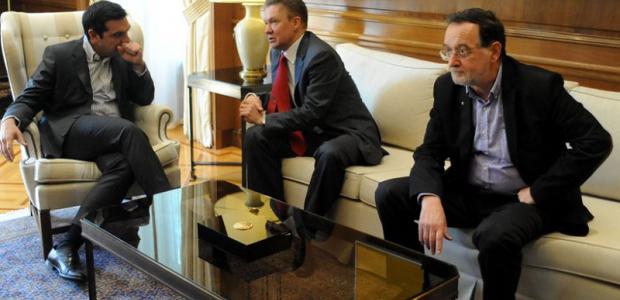No deal was signed yesterday between Greece and Russia for “Greek Stream”, the local segment of “Turkish Stream”, Moscow’s latest natural gas pipeline proposal for supply to the EU from the south, via the Greek-Turkish border area, but both sides appear determined to work on maintaining the prospect.
Gazprom chief executive Alexey Miller, who met in Athens yesterday with Greek Prime Minister Alexis Tsipras and Production Reconstruction, Environment and Energy Minister Panagiotis Lafazanis, was obviously extremely conscious of a fresh European Commission threat, announced just hours after his trip to Athens had been confirmed, of imminent sanctions to be imposed on the Russian energy giant over monopolistic practices and overcharging buyers in eastern Europe, based on the findings of an investigation launched in 2011. The legal action may be announced today by the EU’s competition commissioner Margrethe Vestager, leading to consequent penalties worth billions of euros.
Even though the Greek government’s expectations for a “Greek Stream” deal had remained reserved in the lead-up to yesterday’s meeting, a wave of reports, including one stemming from a Syriza party source, claimed Miller would sign a memorandum of understanding in Athens for the pipeline project in exchange for a sum of between three billion euros and five billion euros as an advance payment to Greece for the country’s anticipated pipeline-linked earnings.
Which raises the obvious question as to why the Gazprom head visited Athens in the first place, even though a deal was not going to be signed. His visit could be interpreted as a move intended to make clear the prospective pipeline project remains a priority on Moscow’s agenda. Also, it came as a swift reponse to the Greek Prime Minister’s official visit to Moscow a fortnight ago, the overall underlying message here being that bilateral ties are warming and that a willingness exists to seek a solution for the pipeline’s development.
Earlier this week, Miller, speaking at a Berlin conference, offered a far more daring stance by threatening to interrupt Russian gas supply to the EU following 2019 if the European Commission obstructs “Turkish Stream”.
Following yesterday’s meeting, both sides appeared keen to keep the pipeline’s prospects alive. But it was made clear that plenty of work lies ahead. The prospect of an advance payment to Athens was not even hinted at. “Turkish Stream”, Russia’s alternative to its indefinitely shelved “South Stream” plan, over EU-linked legal complications – the project was planned to bypass Ukraine, cross the Black Sea and reach Bulgaria’s east coast, further north – will require EU approval. Also, prospective gas buyers will need to be secured before any preliminary progress is made.
Miller ascertained yesterday that “Turkish Stream” will be developed in compliance with EU law, noting this was not a concern for Moscow, and that the project would be developed by a Russian-European consortium. “European companies have already expressed interest to participate,” the Gazprom head remarked.
Certain pundits have suggested that Athens may be willing to go as far as to obstruct the development of TAP (Trans Adriatic Pipeline), the EU-backed rival project to carry Azeri natural gas to the EU via Greece, if the European Commission blocks “Turkish Stream”. This may seem farfetched, but sources noted Greece’s archaeological authority could make life hard for the TAP consortium if it chose to.





